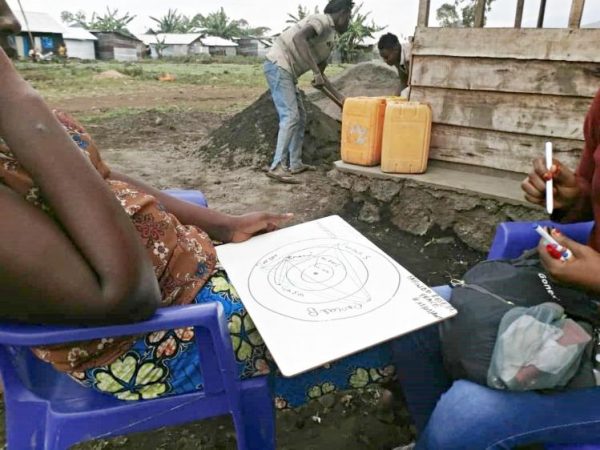Sandrine N’simire is a researcher at the Centre for Public Authority and International Development at the LSE. She discusses the challenge of building trust between researchers and respondents during research in Goma, DRC, and the eventual benefits from approaches that embrace trial and error.This post forms part of a series exploring Going Against the Flow, an ongoing project on water governance in Goma.
I am about halfway through a ten-month research project as a part of Mercy Corp’s IMAGINE programme – a large-scale 5-year programme that will reach up to 1 million beneficiaries in Goma and Bukavu through improved access to water, sanitation, and hygiene (WASH) promotion. The overall goal is to decrease diarrhoea rates among children under five through an integrated approach improving infrastructure, promoting effective behaviour change, reinforcing market systems for WASH services, and improving governance and community accountability of these systems.
My work examines the lives of 24 households in Goma. Three other researchers and I visit the households’ heads every two weeks to collect data about their social networks and financial management. The goal is to understand their lives and coping strategies to help design better development interventions. Now is a good time to reflect on how we have struggled and often succeeded in establishing trust with the households that allows us to conduct this intimate and sensitive research.
The first task for establishing trust with the participating households was to obtain permissions from the chefs de quartier (neighbourhood chiefs) and chefs de avenue (street chiefs) to conduct research in our chosen neighbourhoods. They are gatekeepers for outsiders who wish to work in Goma, and they have the power to facilitate projects or shut them down.

Establishing the chefs buy-in for a project that does not offer participants immediate tangible benefits was difficult. We repeatedly explained that our project aims to help others avoid the failures of past programmes that have been conducted in their areas of influence with little understanding of the lives of ordinary people. Some of these leaders also had to be persuaded that they could not control which households participated.
The first few months with the households were devoted to mapping the social networks they use to access services (such as doctors, the police, education and loans), and those they use for personal support and friendship. We quickly found that there was a lack of trust and understanding about what and why we were asking about such things. This resulted in surface level answers and much obfuscation. Many people also wanted us to ask our questions in a quick survey-like manner and requested money for their time. We interpreted this as the households, quite reasonably, guarding their important networks from prying outsiders and wanting remuneration.
These initial challenges were eventually overcome through three main approaches: first, we found that indirect questions and asking for stories of how they access services was a better tactic than direct network tie style questions. Second, by having participants draw out their networks they began to understand the level of depth we required. Third, we repeatedly re-explained the project’s purpose, reminded household of who we were and their lack of obligations to participate. Over time, this allowed households to talk about their lives in their own ways.
“Intimacy is also cultivated in more everyday scenarios. For example, it is now common for the research team to drop into the households when passing by […] for masolo (small talk in Lingala), a way to let them know that we are not trying to become another of the DRC’s many extractive industries.”
Trust, however, is also often about intimacy. Indeed, as the project has unfolded, we have come across many delicate or sensitive stories that reveal how participants draw upon their networks and manage their finances.
Understandably, many participants hesitate to divulge the full details. To deal with this, when appropriate and safe, I offer my own stories as a way of connecting with participants and creating common ground. For example, a widow heading one of our households has been facing difficulties following her husband’s death. By sharing the troubles my family dealt with following my father’s death, including the debts he left behind, the widow gradually began to tell her own story.
This will not work, or even be the ethically right course of action, for all our participants. However, for some, it proves how long-term ethnographic research of this nature requires a level of intimacy usually not seen in the social sciences.
Intimacy is also cultivated in more everyday scenarios. For example, it is now common for the research team to drop into the households when passing by. These visits are not for collecting data. They are for masolo (small talk in Lingala) and a way to let them know that we are not trying to become another of the DRC’s many extractive industries.
At their request, we have also participated in households’ important life events such as weddings and funerals. This is a way of showing solidarity with our research participants as we increasingly become a part of their lives. It is also, from our perspectives, the right thing to do.
As our project begins to focus more on the collection of the households’ financial management data, the trust we have built so far through researching their social networks is proving invaluable. It is enabling us to ask difficult questions about how they use their money to activate their networks, and to fill in the gaps when the numbers or stories don’t accord with what we already know.
However, I end on a note of caution: our experiences suggest that this kind of research method cannot be easily learnt. Rather, it is a constant process of trial and error, with our approaches constantly adapted to each of the households’ needs and preferred ways of sharing intimate information.
Featured image: UN Photo/Marie Frechon, CC licensed